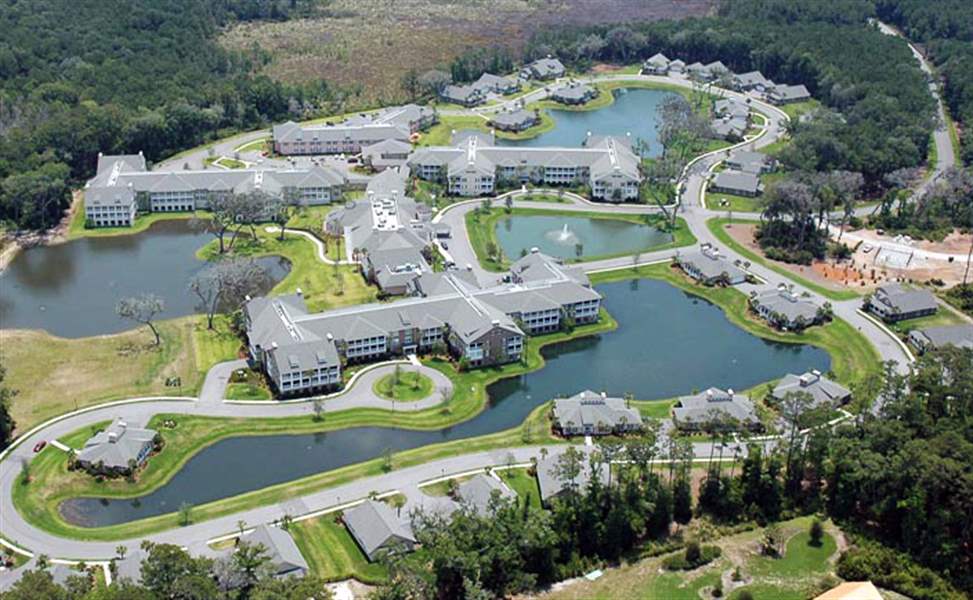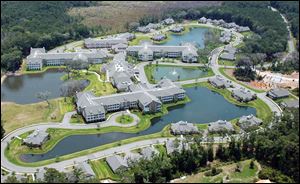
As boomers age, need for memory-care facilities grows
10/21/2013
The Marsh's Edge continuing care retirement community in St. Simons, Ga., features villas, apartment homes assisted living, memory care, and skilled nursing services.

The Marsh's Edge continuing care retirement community in St. Simons, Ga., features villas, apartment homes assisted living, memory care, and skilled nursing services.
ATLANTA — Any day now, Joni Poulos will help her father move into a place at Autumn Leaves, easing a burden she has carried since she discovered he suffered from dementia.
“The minute they say we can move in, we’re gone,” she said.
Poulos is one of a growing number of adult children caring for their elderly parents, many of whom suffer from debilitating ailments like Alzheimer’s and other forms of dementia.
Her father, John Calhoun, 97, lives in an assisted-living facility in Colquitt, Ga., where he was born and raised, and until recently was pretty much self-sufficient.
Autumn Leaves is designed exclusively for people suffering from Alzheimer’s and other types of dementia. The 26,000-square-foot Gwinnett, Ga., facility, with a capacity for 46 clients, will be the 28th Autumn Leaves property in the U.S. and one of two opening soon in metro Atlanta.
“There is an increasing need for specialized care as our population continues to age,” said Matt Summerville, executive director of Autumn Leaves of Sugarloaf.
By 2025, the number of people age 65 and older with Alzheimer’s disease in the U.S. will grow to 7.1 million, a 40 percent increase from the 5 million currently, the Alzheimer’s Association says.
As her father’s health declined, Poulos naturally became more concerned and began the search for a place closer to her home in Lawrenceville, Ga. Nothing in the area suited her. Then she heard about Autumn Leaves’ planned foray into nearby Suwanee, Ga.

“The one thing that I liked at Autumn Leaves is they do nothing but memory care,” Poulos said. “They have put a lot of thought and care into every room, even down to the acoustics and lighting. That attention to detail, especially for the elderly who struggle to hear, is important and are going to make my dad’s daily life so much more comfortable, and that’s the most you can do for someone suffering with so many ailments.”
Autumn Leaves is among a “handful” of facilities across the country specializing in dementia care in response to the increasing number of people suffering from the disease, said Carol Steinberg, president of the Alzheimer’s Foundation of America.
“Facilities are recognizing that they need to adapt in order to safely care for individuals with Alzheimer’s disease,” Steinberg said.
Ruth Drew, Alzheimer’s Association director of family and information services, said the number of people with Alzheimer’s disease is growing rapidly and will continue to do so because there is no cure or disease-modifying treatments. So it stands to reason that we will see increasing numbers of facilities being built or expanded to meet the demand for care of people with Alzheimer’s.
In addition, AARP just published a study that states the number of potential family caregivers is not keeping pace with our aging population — another trend that may signal an increasing need for facilities that provide memory care.
There are essentially three types of facilities to choose from, Steinberg said:
■ Facilities that only take people with dementia like Autumn Leaves, which are in the minority but growing.
■ Those with a special floor or floors or wings for people with dementia.
■ Facilities that provide a wide range of care, but don’t separate clients based on needs.

A growing number of facilities recognize dementia patients need specially trained staff to deal with the various behavioral challenges, and offer therapy and activities that help with stimulation and socialization as well as very practical issues such as eating as the disease progresses, she said.
“That’s a good thing, because all of these things can improve a patient’s quality of life,” Steinberg said. “I think that’s why it’s part of a national trend.”
Facilities such as Autumn Leaves cater to the specialized needs of memory-impaired patients. For instance, the staff will undergo training to become Certified Dementia Practitioners. Residents also will not have to leave, as it will provide access to an on-site beauty salon and medical care. A chef will work with doctors, a nutritionist, and dietitian to create meals prepared from scratch.
Even the building is designed to allow for lots of natural light. That increases melatonin production, which in turn increases stimulation and appetite. Coupled with hallways that give the impression they continue indefinitely, experts believe, the two help prevent claustrophobia and alleviate symptoms of dementia.
Services go beyond the needs of the patients. Families of residents can participate in caregiver support groups, day-stay, and respite programs, said Jodie Massey, the regional sales director who has overseen the opening of Autumn Leaves communities throughout Texas and Oklahoma.
“They need a break so they can take care of themselves,” she said.